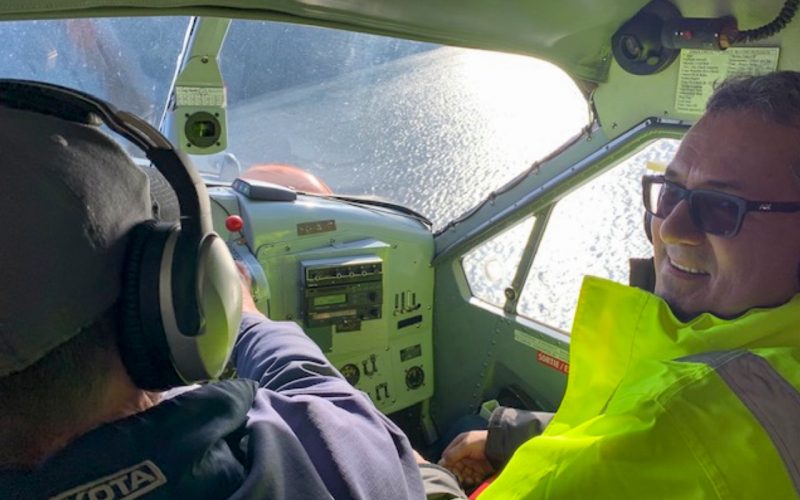“Indigenous reconciliation is about respect not rhetoric”
Grieg Seafood’s new Director of Reconciliation has walked-the-walk of indigenous life in Canada
By Fabian Dawson
SeaWestNews
Growing up in the isolated hamlet of Aklavik, about 200km north of the Arctic Circle in Canada’s Northwest Territories, Orland “OD” Hansen lived off the land that was home to the Inuvialuit, Metis and Gwich’in First Nations.
Here, surrounded by remote wilderness and remarkable wildlife, Hansen experienced the residential school system, where Canada forcefully held thousands of indigenous children, while his people struggled with colonialism and dispossession.
And it was from this resilient community which prides itself today as “the town that wouldn’t die”, Hansen began his journey towards reconciliation that took him to Alberta’s oil patch and now to the waters of British Columbia.
“Indigenous reconciliation is about respect not rhetoric,” Hansen told SeaWestNews as he finished packing for his move to Campbell River, where he will begin his new role as Director of Reconciliation for salmon farming company, Grieg Seafood BC.
With an applied degree in Petroleum Engineering Technology, Hansen began work as the lead on Indigenous engagement and consultation projects in the Northwest Territories before moving to Alberta. Over the past 20 years he has focussed on Indigenous relations in the oil and gas industry working full time with companies like Schlumberger and Husky Energy.
As the Director of Reconciliation, Hansen will work with coastal Indigenous communities, liaise with Grieg BC’s employees to help the aquaculture company move towards better understanding of the importance and purpose of reconciliation with Canada’s Indigenous peoples.
“I thought that it was very interesting and forward-thinking for a company to appreciate that the climate is changing across the country in every industry,” said Hansen, a father of three daughters, who is of Inuit-Danish descent.
“To me, it’s progressive for a company like this to realize, ‘Let’s be in front of the curve and lead by example, let’s become engaged now rather than because you have to, and take the lead.”
“I’m really excited,” Hansen said about his new role that has taken him from the ‘Muskrat Capital of the World’ to the ‘Salmon Capital of the World’.
“This is dear to me, and something I’d really like to do. It shows respect. It shows that the company and their ideals are such that they have an appreciation of where they are and of the people that are indigenous to that area. It’s in my job title, but I would have to gain appreciation from the communities here and what they think reconciliation means to them and what they think we as a company should be working towards.”
“The onus is now on industry as well as government to keep [reconciliation] going, to keep showing that you’re serious about working with Indigenous communities, about listening to them and following up on it – taking their advice and requests and actually doing something about it.”
Rocky Boschman, managing director of Grieg Seafood BC, which is celebrating its 20th year salmon farming in BC., said the new position is a further recognition of “the value and importance of our Indigenous partners in the territories where our farms are operating.”
Grieg’s workforce includes 10% Indigenous persons with 12 of its salmon farms operating in partnership with First Nations.
“Having our employees recognize the United Nations Declaration on the Rights of Indigenous Peoples (UNDRIP) and our commitment to reconciliation will be supported by the insight Orland has developed over several decades,” said Boschman.
Hansen said he will be working closely with Marilyn Hutchinson, Grieg’s director of Indigenous & Community Relations, who deals with improving the economic future of First Nations salmon farming communities.
Hutchinson, who joined Grieg in April 2011, has been sharing information on the company’s farming activities among local residents, local government officials and business organisations, drawing up negotiated compensation agreements, identifying employment opportunities for First Nations communities and sponsoring community events and indigenous sports teams.
Together with Hansen, Hutchinson and other Grieg company officials will accompany a delegation of hereditary chiefs, councillors and fisheries advisors representing their First Nations to Norway next week.
“The trip’s purpose is to show our First Nations partners that the technology around salmon farming in Norway is generally the same as it is in B.C., and that we at Grieg BC offer our partners the same level of technology at our farms and hatcheries,” said Katie Maximick, the company’s community relations specialist.
“We will be touring farm operations, a hatchery and a processing plant in the Rogaland region of Norway. We will also be meeting our colleagues at our head office in Bergen for some cultural and historical presentations from BC and Norway.”
(Image; Orland “OD” Hansen in a float plan)

